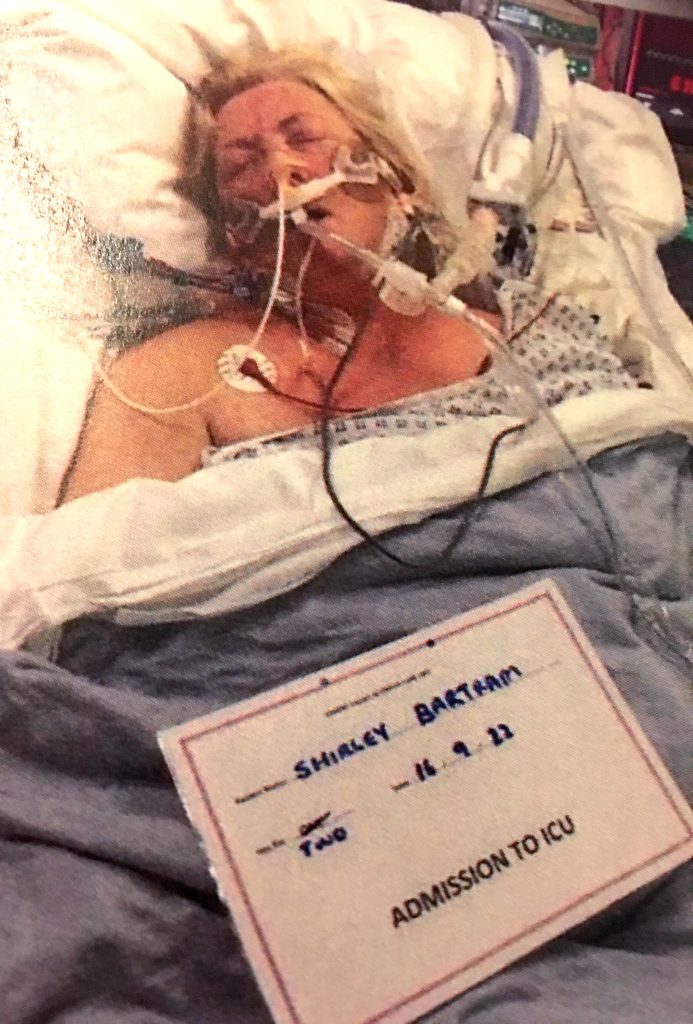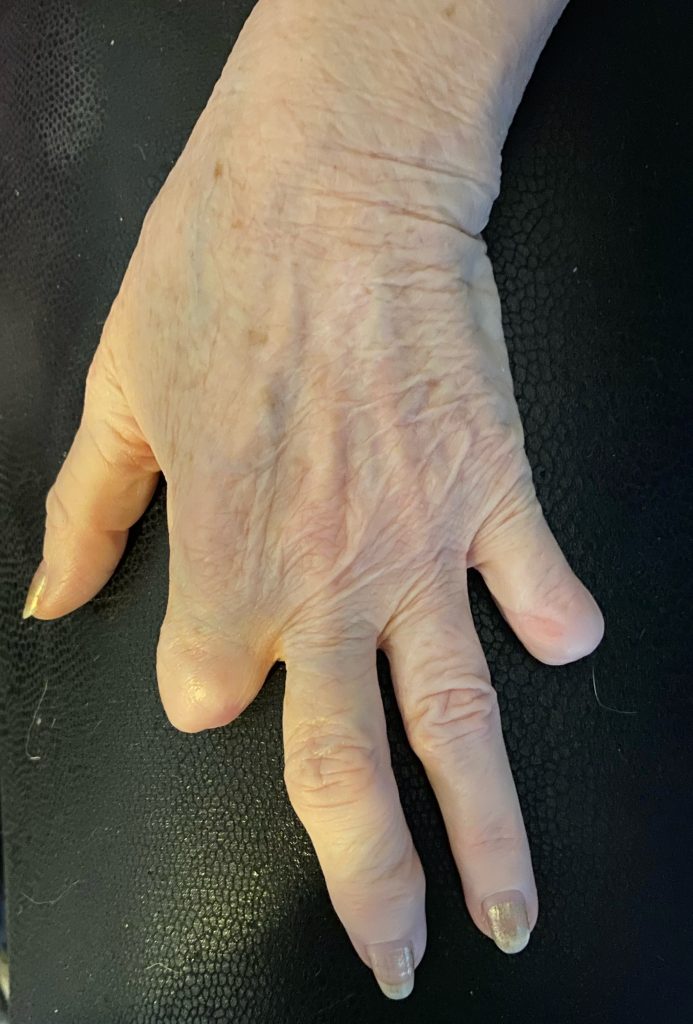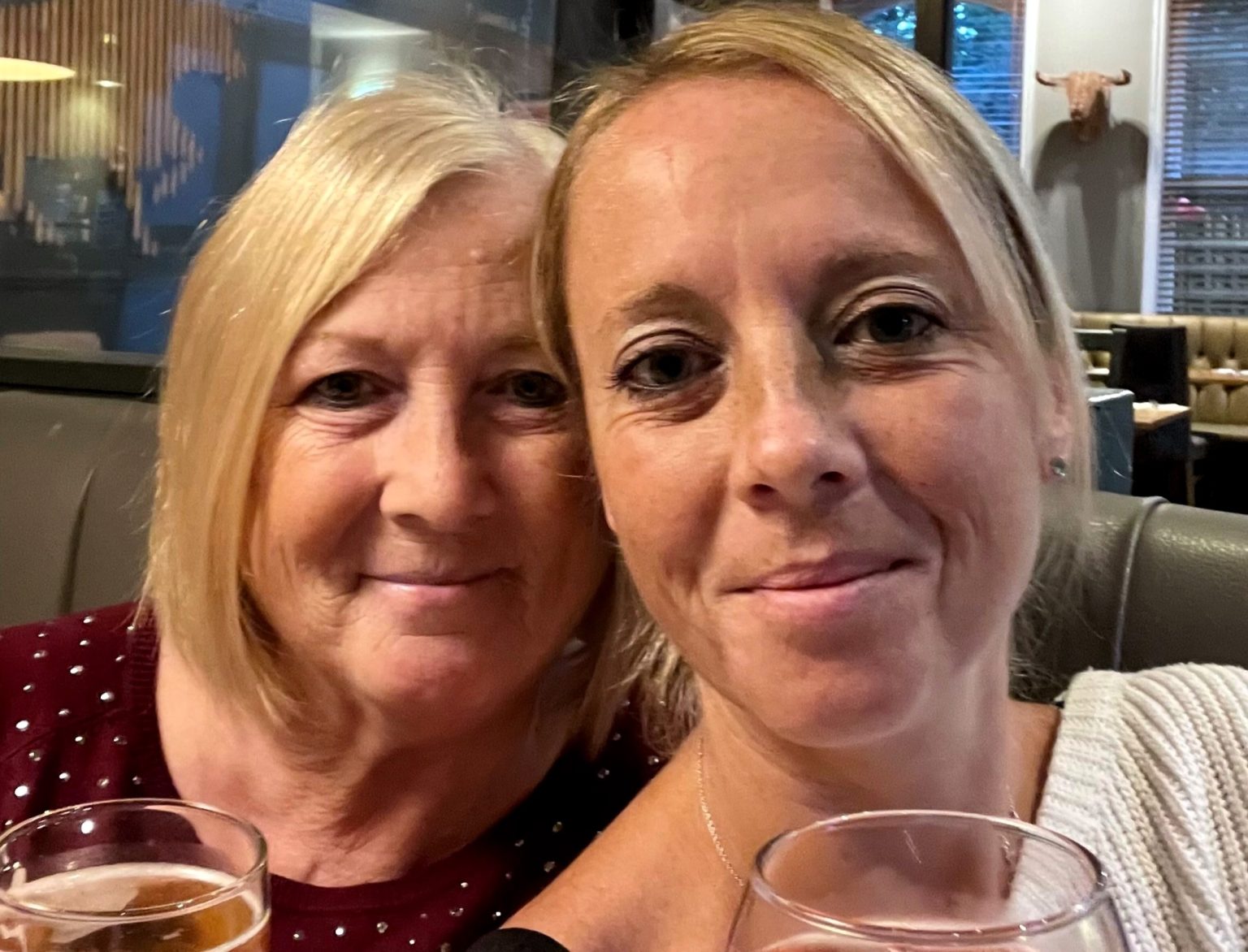A gran has revealed how her fingers and toes turned black before ‘dropping off’ following an antibiotic blunder.
Shirley Bartram had been suffering with severe pain in her left side, coupled with vomiting, a raised heart rate and the inability to pass urine for 12 hours.
The mum-of-four was rushed to the hospital and was diagnosed with a suspected kidney infection.
READ MORE: Nine-year-old boy helps save dad’s life after becoming one of the youngest stem cell donors
The 69-year-old, from Gravesend, was prescribed intravenous antibiotics, though was discharged only mere hours later and sent home with oral antibiotics instead.
Shirley’s condition severely deteriorated quickly, and the gran was placed into an induced coma for four weeks.
And when she woke up, the tissue in her hands and feet had started to die and turn black – where her fingers, a thumb and the tips of toes suddenly “dropped off”.
“Before all this happened, I was independent and active,” Shirley, a former carer, told Need To Know.

“Now, I struggle with the simplest things that many people take for granted.
“Holding a pen is impossible, and I need help with things I used to do without thinking – buttoning clothes, washing my hair, preparing meals.
“I can’t manage stairs without help.
“Walking is painful and exhausting.
“I wear a brace on my left foot to try and stop it catching, but I still fall over.
“I can just about walk to the local shop aided with a walking stick and also some trips out to the cinema – but I am sometimes limited.”
Shirley, following being discharged from the hospital initially, was sick through the night and re-admitted the next afternoon in September 2022.
She was diagnosed with sepsis, which is believed to have been caused by the aforementioned kidney infection.
In total, Shirley spent four weeks in intensive care and nine weeks in hospital.
Now, she only has her fourth and little finger remaining on her right hand, with her index finger and little finger lost on her left.

Shirleys hand now. (Jam Press/Irwin Mitchell)

Shirley’s hand now. (Jam Press/Irwin Mitchell)
Her toes are gradually self-amputating, and bones in the feet have also changed shape.
Shirley, who lives with her daughter, Kelly, 47, is suffering from repeated swelling in her right hip because of infections and has experienced leaking from a wound in her top right leg.
Metalwork from a previous hip displacement has loosened as a result, and it’s a waiting game while doctors try to find a solution.
She said: “It’s not just the physical toll, it’s the emotional one too.
“[…] I feel very self-conscious about my hands.
“I can’t thank Kelly enough for everything she does for me, but it’s upsetting to think about what has happened and how much independence I’ve lost.
“It’s hard to accept.
“I’m still concerned whether everything possible was done to prevent what happened to me, and the least I feel I deserve is answers.
“However, I just hope that by sharing my story, I can raise awareness of how dangerous sepsis is so others don’t have to go [and] endure what I have.”
Shirley has instructed medical negligence lawyers, Irwin Mitchell, to investigate her care at Darent Valley Hospital.
Josh Beszant, a specialist medical negligence lawyer representing Shirley, said: “The last few years and coming to terms with her life-changing injuries have been incredibly difficult for Shirley.

Shirleys foot now. (Jam Press/Irwin Mitchell)

Shirleys toes turning black following an antibiotic blunder. (Jam Press/Irwin Mitchell)
“She was previously very independent but has now lost this and is more reliant on her family.
“While the Trust has admitted that intravenous antibiotics should have been given, but were not, Shirley firmly believes more should have been done to help and monitor her during her first hospital visit.
“Nothing can make up for what she’s been through, but we’re determined to secure Shirley with access to the specialist support and therapies she requires.
“We call on the Trust to resolve the remaining issues in this case, allowing Shirley to focus on her rehabilitation.
“In the meantime, we join her in warning of the dangers of sepsis and the need for everyone to be aware of the signs.
“Sepsis is a medical emergency with early detection and appropriate treatment vital to preventing serious injury and even death.”
A spokesperson for Dartford and Gravesham NHS Trust said: “Dartford and Gravesham NHS Trust is very sorry for the distress and complications experienced by Ms Bartram and her family.
“We recognise how deeply personal and difficult this is for everyone involved.

“While legal proceedings are ongoing, and to respect patient confidentiality, we cannot comment on individual clinical details.
“However, we have acknowledged shortcomings in certain aspects of the care provided, and we are fully cooperating with the legal process that will determine cause and effect.
“We remain committed to learning and strengthening our procedures to ensure the highest standards of safety and care for all our patients.
“We actively support national initiatives to raise awareness of the signs of sepsis.
“Early recognition and prompt treatment are vital, and we remain dedicated to working with our staff and the wider community to promote greater understanding of this serious condition.”










